Escape from the Planet of the Apes (1971)
Directed by: Don Taylor
Written by: Paul Dehn, Pierre Boulle
Starring: Bradford Dillman, Kim Hunter, Natalie Trundy, Roddy McDowall
USA
AVAILABLE ON BLU-RAY, DVD and DIGITAL
RUNNING TIME: 98 mins
REVIEWED BY: Dr Lenera
MAJOR SPOILERS!
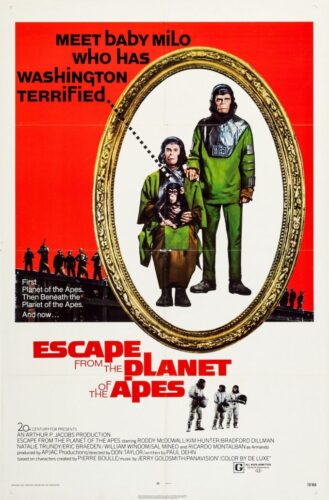
Earth is blown to smithereens by George Taylor, but just prior to this Cornelius and Zira manage to escape with the also friendly Dr. Milo in Taylor’s spaceship. The shock wave of the explosion sends them through a time warp that brings them to 1973 Earth, splashing down off the Pacific coast of the United States where they’re transported to a secluded ward of the Los Angeles Zoo. Dr. Milo is killed by a zoo gorilla who became agitated by the chimpanzees’ speech, but Cornelius and Zira befriend Dr. Lewis Dixon and become celebrities. But should they mention the fact that apes will eventually take over the planet?….
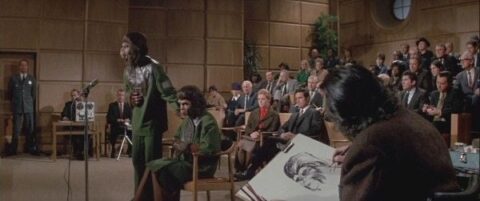
So Beneath The Planet Of The Apes ended in a way that surely should have ended the series; the world is destroyed in one of the most gobsmacking endings in science fiction cinema. However, when the box office receipts were very high, producer Arthur P. Jacobs sent screenwriter Paul Dehn a telegram that read “Apes exist, Sequel required.” So a sequel is what people got, yet it’s a sequel which manages to also be a prequel, in that it begins to tell of how the strange world we were introduced to in Planet Of The Apes came to be, and one which quite explicitly sets things up for the films to follow, unlike the previous two entries which were not intended to have sequels at all. Escape From The Planet Of The Apes seems to be a fan favourite, with some claiming that it matches the first film. I wouldn’t go anywhere near as far as that, even if I still do very much like it. Much of it works as a neat reversal of Planet Of The Apes; contemporary society reels at the idea of two talking apes who are placed in a zoo where there abilities are discovered by a couple of sympathetic and animal scientists, but their existence is a threat to a scientific ruling elite who want them terminated. There’s more humour, at least for the first two thirds, yet still at the same time a pulpable feeling of tragedy. This is paid off in a devastating ending which still has the power to make this critic shed a tear or two, and it’s wonderful to see Zira and Cornelius be the two main characters. However, for too much of its length the film rather plods along repeating scenes, and it looks rather flat and TV-like, with workmanlike direction from Don Taylor. And there are some major contradictions with what we’d learnt previously which are hard to ignore.
So poor Dehn had his work cut out for him in trying to construct a third film from the ending of the second. He was steered in the right direction by a re-read of Pierre Boulez’s Planet Of The Apes novel from which he took more than he did in 1968, and by 2oth Century Fox providing a lower budget. He thereby decided to craft a story originally entitled Secret Of The Planet Of The Apes which was set on present day Earth. This removed the need to create elaborate sets and have lots of characters requiring makeup. The latter though led to Kim Hunter [Zira] and Roddy McDowall [Cornelius] feeling isolated on the set because they were the only cast members dressed as apes, something which had certainly not been the case on the first two movies. But at least their makeup was a bit quicker to put on this time, now only three and a half hours rather than four. Sal Mineo agreed to appear in the film as Dr. Milo because he hoped it would restart his career, but when he found the make-up uncomfortable, the script was re-written to kill his character off much nearer the beginning then was originally intended. This was his final theatrical film before he was murdered in 1976 at the age of 37. Scenes of Zira mistaking a toothbrush for a hairbrush, and of Cornelius and Lewis playing golf, were in an early version of the script, but were not used in the actual movie, and a death by Doberman Pinchers was removed from the climax as it was though too nasty. Production was rushed due to the low budget, being filmed in only six weeks, but it still made a large profit.
It was originally going to begin with us seeing Cornelius, Zira and Dr. Milo escape as the Earth is destroyed before their eyes, but it’s better that our first sight of the apes is when they’ve crash landed on earth and the soldiers gathered round are shocked by this, though already we’re asking ourselves a question; would the ape society have really been advanced enough for individuals to salvage and fly that spaceship? It didn’t look that way. And come to think of it, nobody seems to notice that the apes who climb out of the spaceship are much larger than normal chimpanzees, and even walk upright. The apes decide that it’s best for them not to speak, at least not yet, but Zira can’t help but express her impatience when a banana is dangled above them to see how they react. “Because I loathe bananas!“, she cries, which is actually a reference to Kim Hunter’s real distaste for this fruit, which originated during the filming of the first film. The actors portraying apes were required to keep their makeup on during breaks in order to save time, so the rest of the crew often called them monkeys and offered them bananas. “Does the other one talk”? says one of the men questioning them. “Only when she lets me” replies Cornelius. What first really surprises Lewis and Stephanie is when the chimpanzees change their clothes, then when Zira pulls up a chair to sit on before Lewis does. We can’t help but be distracted by the man-in-suit gorilla in the cage even though it’s a very good suit, but again we’re totally invested in Cornelius and Zira, the couple who’re totally in love but who like to bicker, with her hatred of lying the only major difference between the two. Roddy McDowall exudes so much emotion from his physical acting while with Kim Hunter it’s her eyes, they’re just so expressive and shine through the makeup. We don’t like it when people don’t just accept their characters right away, because we’ve grown to love these two, and they seem more vulnerable than Charlton Heston and James Franciscus’s tough guy astronauts.
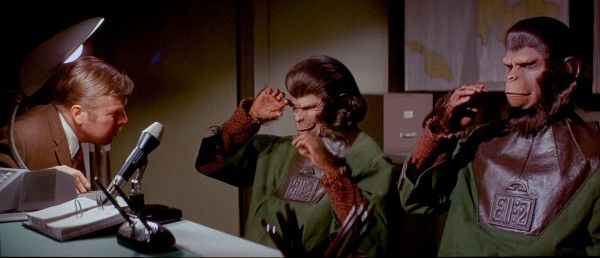
Their humour and general pleasantness of character soon wins over most people, but the President’s Science Advisor Dr. Otto Hasslein wasn’t sure about them from the start and becomes especially suspicious when Zira starts to blurt out about dissecting humans before correcting herself. There’s a lot of the apes enlightening the humans on what will happen in the future and what the eventual ape-controlled world will be like, perhaps a bit too much, especially when we’re told that a plague will kill of all pets and humans, that humans will take apes as pets instead, and that the enslaved apes will rise when one ape says “No”. Even 1971 viewers must have thought that this is what we’d see in the fourth movie, ruining any surprise. But I like the character of Hasslein [whose name is a variant on the German word for “hate”]; while he stoops as low as to give Zira alcohol and a truth serum to get the information he wants, then, once he knows that Zira is pregnant, becomes determined to kill the apes, he has a point. He wants to prevent a possible bleak future for mankind. And, while we don’t like some of the way the apes are treated, it’s little different to how we previously saw how apes treated humans – in fact that was worse! There’s not quite enough urgency when the apes go on the run, and I could have done with more of a nationwide hunt for them rather than the much more reduced flight which we get; an extra fifteen or so minutes focusing on this would have been good. Yet one has to admire the way that the aim of making a more character and dialogue-led piece was stuck to, and when the finale comes it’s properly upsetting despite the happier coda that follows it. When we saw the Statue of Liberty we were startled and wowed. When we saw the world destroyed we were just startled, startled that a film could end this way. But in terms of emotional investment, the gunning down of characters that we love [her crawling to die on top of him is heartrending] can’t be beat, and I do recall that the first time I saw this, I really did believe that they’d shot the baby!
We’re not sure whether the time-traveling apes can change the future, or whether their appearance in the past actually creates the future they come from; we get a suggestion that one of these is the case, but that’s all. I think that the events we see speed up things that were going to happen anyway. This would explain the anomaly which has Cornelius talks about ape history and evolution in a way that isn’t exactly followed through, most notably in terms of time and the name of the ape who’ll lead the revolt during the next two installments, The circumstances for the future will now have differences, and the apes will evolve at a much quicker rate. However, try as I might, I just can’t explain away how before, it was established that the ape society [other than Dr. Zaius] had completely forgotten that an intelligent human society had preceded the ape civilisation, yet here Cornelius says that his people knew that dumb apes had once served human masters, even mentioning an annual ape holiday commemorating the historic day when the apes revolted against their human masters. Huh? Another inconsistency is that Cornelius and Zira know how the apes came to seize control of the Earth from humans and even state that this story is told in the Sacred Scrolls, the holy books of the apes’ religion. In Planet of the Apes we are to understand that the Scrolls explicitly deny that humans ever had the powers of speech and reason, which is why Zaius is so reluctant to admit that Taylor can speak. Yet here he’s not surprised by humans talking, nor is he surprised to see that humans have an advanced civilisation. Yes, in Planet Of The Apes, his archeological digs were beginning to lead him to believe humans might once have been civilised, but now he suddenly knows how advanced humans were, and even how apes fit into it. And he claims that all of this was written in the Scrolls! In reality, Cornelius and Zira should also be very surprised at the world they find themselves in.
The racial undertones are again present and correct, especially with regard to Hasslein whose paranoia leading him to treat as enemies those who bear no ill-will to him and his kind and whose only crime is to be different from him, while Cornelius finds being called a monkey hugely offensive. Added to this are some religious undertones, from the President comparing the plan to kill an unborn child to the Massacre of the Innocents, to Zira giving birth to who we already know will become a Messiah for the apes in surroundings not unlike where Jesus was born. The place where this happens is a circus ran by Ricardo Montalban’s Armando in a typically exuberant performance by the actor who provides some light relief during the downbeat final third. Taylor and cinematographer Joseph F. Biroc like to use extreme long shots as was common at the time, though sometimes they seem to be straining to make the film seem bigger than it actually is. Taylor does know how to direct the audience’s attention to the humour without having to bonk them over the head. Jerry Goldsmith returned to composing duties this time, and wrote a score that was very different, yet which still managed to incorporate a few percussion sounds from his Planet Of The Apes in some of the variations of his quirky, slightly poppy main theme whose driving rhythm dominates the score, though Zia and Cornelius get a delicate melody all to themselves. Lacking the exotic weirdness of the proceeding entries but certainly not short of big ideas despite it being quite small scale, Escape From The Planet Of The Apes gets by largely on sheer conviction and its two wonderful lead characters who are the real stars of this original series, and who will be missed in the last two films – though at least Roddy McDowall will return.
Rating: 











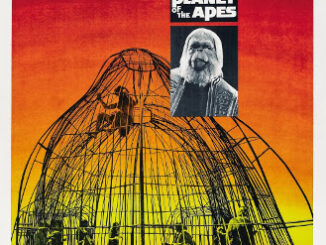
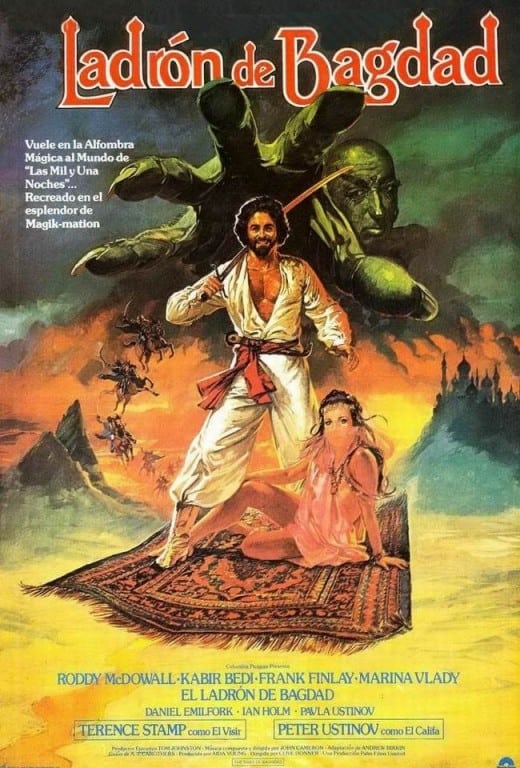
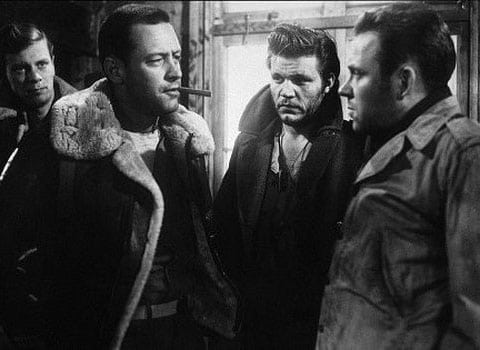
Be the first to comment